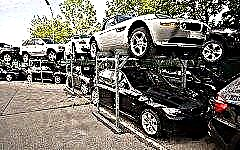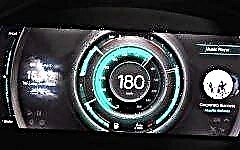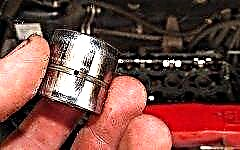

The content of the article:
- Why do hydraulic lifters make noise (knock)
- How to fix the problem
- Features of operation of hydraulic lifters
During the working heating of the engine, the parts of the gas distribution mechanism (timing) also heat up, as a result of which their thermal expansion occurs and the gaps between them change.
If the clearances are not properly adjusted, then the valves in the timing belt will also close incorrectly, as a result of which they will burn out, and a knock will appear. In addition, the size of the gaps can change with severe wear of the timing mechanisms during operation. Since the adjustment of valve thermal clearances is a rather complicated and responsible matter, instead of levers and washers that require complex adjustment, they began to use hydraulic compensators.
The hydraulic compensator (hydraulic pusher) is a small mechanism that automatically adjusts the thermal clearances of the timing valves, without any additional settings. This miniaturized mechanism automatically adjusts the clearances to the required dimensions by the action of the spring and the pressure of the engine oil.
Why do hydraulic lifters make noise (knock)

If the hydraulic lifters do not work properly, the engine starts to run louder than usual, with a loud, frequent thumping, in which a metallic tint may appear over time. When the engine is running in this way, it is often said that the motor is "screeching". Hydraulic expansion joints can knock for the following reasons:
- Engine oil problems.
- Hydraulic lifters are mechanically worn out or damaged.
"Oil" problem
The correct operation of hydraulic lifters is highly dependent on such oil factors as:
- quality, freshness, and compliance with the engine manufacturer's recommendations.
- level.
- pressure.
The use of low-quality engine oils, as well as the long operation of the engine with old (used) oil, leads to the accumulation of carbon deposits, which begin to impede the movement of the compensator's moving elements. In addition, there is a clogging of the cylinder head channels and the holes of the hydraulic lifters.
When the engine oil level exceeds the norm, it foams in the crankcase and loses its homogeneity., with a subsequent change in indicators: viscosity, thermal conductivity and lubrication. The speed of oil passage through the channels depends on the viscosity, which directly affects the operation of the hydraulic compensators - after all, with a strong thickening of the oil, clogging of the channels can occur, and the liquid stops flowing (or starts flowing more slowly) into the expansion joints.
On the other hand, with highly thinned oil, the pressure in the oil system may drop, and the oil will also poorly enter the expansion joints. And when the oil level in the engine is below normal, the oil pump sucks in air when delivering fluid to the expansion joints, which also negatively affects their operation and leads to a knock at high engine speeds.
Insufficient oil pressure may be due to pump malfunction, as a result of which the oil will be pumped into the hydraulic compensator slowly or not at all. In addition, a decrease in pressure inside the compensator can occur due to oil dilution or clogging of the oil channels of the hydraulic compensator itself.
Wear and mechanical damage
- In the process of heavy operation of the engine, scoring and dents can occur on the body and plunger of the hydraulic compensator. In this case, a characteristic knock will be heard at any speed of rotation of the timing camshaft.
- If the check valve is faulty, the hydraulic lifter will knock on a cold engine immediately after starting it. But the knocking will stop with increasing revs. Also, the knock can disappear on a warm engine, also with an increase in speed.
- If the plunger pair is worn out, then a knock will appear on a warm engine, but it will not occur if the slightly cooled engine is restarted.
How to fix the problem of noise (knocking) of hydraulic lifters

The solution to the problem with the noise (knocking) of hydraulic lifters consists of two stages:
- Oil and oil filter change, with engine flushing.
- Inspection (diagnostics) of hydraulic compensators and their replacement or flushing (flushing the compensators is an ambiguous question).
In this case, the second stage will be required only if it was not possible to solve the problem with knocking at the first stage. If, after changing the oil, oil filter and flushing the engine, the knocking stops, then, of course, nothing else is required.
The first stage is the easiest and most affordable: drain the old "working off", fill in the flushing liquid and turn on the engine for 15 minutes. Then drain the "flush", install a new oil filter and fill with new oil.
The second stage is more difficult and time consuming... Here you will need to inspect and check the hydraulic lifters themselves, for which you will have to remove the valve cover.
The most common diagnosis of hydraulic lifters is to push them through. To do this, you need to release the compensators from the pressure of the camshaft cams by turning the camshaft accordingly (with the short part of the cam towards the compensator so that the cam does not press on it). It is better to push the expansion joints with a wooden pin so as not to damage their surface.
Serviceable hydraulic lifters are very difficult to push through, and faulty ones are pressed through quite easily. When pushing through all expansion joints, it is possible to compare which of them are difficult to give in and which are easy. Expansion joints that push through easily compared to others are best replaced.
Flushing the hydraulic lifters themselves is an ambiguous question, since theoretically the expansion joints should be automatically flushed when flushing the engine during the oil change stage. Therefore, removing / disassembling / flushing / assembling / installing expansion joints can be unnecessary work and a waste of time. Especially when there are 16 hydraulic lifters. In this regard, the removal and disassembly of hydraulic lifters is recommended only for a more thorough inspection, when there are no other options for solving the problem. And at the same time, you can wash it.
It is also advisable to remove expansion joints if they manage to consider obvious mechanical damage and deformation.
Features of operation of hydraulic lifters

- For more reliable and durable operation of hydraulic lifters, it is recommended to change the oil a little earlier. For example, if, according to the maintenance regulations, it is necessary to change the oil after 15 thousand kilometers, then it is better to replace it 2-3 thousand kilometers earlier.
- For normal operation of new expansion joints when installing them, it is not recommended to remove the factory preservative grease from them.
- If it is required to replace one or several faulty expansion joints, it is better, if possible, to change everything at once, since if one breaks down, the rest will soon "fall down" as well.
- After replacing faulty (or old) hydraulic lifters with new ones, before starting the engine for the first time, it is recommended to turn the crankshaft 5-6 times by the ratchet so that the plunger pairs of the new hydraulic lifters take the correct working position.
Conclusion
As practice shows, the most common reason for the noisy operation of hydraulic lifters is the use of bad oil - either of poor quality, or old (used), or not recommended by the engine manufacturer.
Therefore, in most cases, the problem of noisy operation of compensators is solved already at the first stage, by changing the oil and filter, as well as by flushing the motor, during which the compensators must also be flushed. And the knock of "hydrics" due to wear or damage happens much less often.











